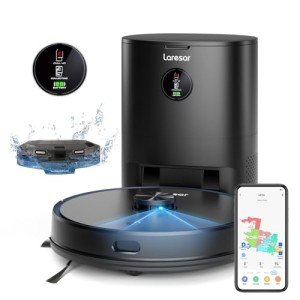This Is The Intermediate Guide For Robot Vacuum Cleaner
The Rise of Robot Vacuum Cleaners: A Comprehensive Guide
In the last few years, robotic technology has actually permeated numerous elements of every day life, substantially changing how jobs are achieved. One of the most cutting-edge developments in this area is the introduction of robot vacuum cleaners. These devices have actually moved from a high-end item to a vital home tool, offering convenience and efficiency to millions of users around the globe. This post will check out the mechanics, benefits, limitations, and popular models of robot vacuum, in addition to address some frequently asked questions.
What is a Robot Vacuum Cleaner?
A robot vacuum is an autonomous device created to clean floors without human intervention. Geared up with sensing units, brushes, and vacuum technology, these little makers can navigate a home, efficiently getting dirt, dust, and particles. Many modern designs feature different features, including Wi-Fi ability, smart device applications, and home mapping innovation, which allow users to keep track of cleaning progress remotely.
How Robot Vacuum Cleaners Operate
Robot vacuums utilize a number of technologies to guarantee reliable cleaning. Below are the main parts that add to their performance:
Navigation Sensors: Most robot vacuums feature numerous sensing units (infrared, ultrasonic, and so on) that help detect obstacles, stairs, and walls, permitting the gadget to browse a room efficiently.
Suction Mechanism: The vacuum employs a suction system to gather dirt and dust from surface areas. Many models utilize sophisticated cyclonic innovation to enhance suction power.
Cleaning Brushes: Different types of brushes (side brushes, rolling brushes) assist in loosening dirt and guiding debris into the vacuum's suction area.
Battery System: Operating on rechargeable batteries, robot vacuums can clean autonomously for a fixed period before going back to their docking station to recharge.
Smart Features: Many designs are geared up with Wi-Fi connection, permitting users to control cleaning schedules, suction power, and zoning via smart device apps. Some even support voice control through wise home devices like Amazon Alexa and Google Assistant.
Benefits of Robot Vacuum Cleaners
The combination of robot vacuum cleaners into everyday cleaning jobs provides several significant advantages:
Time-Saving: They perform cleaning autonomously, enabling users to focus on other important activities.
Consistent Cleaning: Robot vacuums can clean up on a regular schedule, guaranteeing that dirt and dust do not build up.
Convenience: Most designs can be run while users run out your home, and even from remote areas through mobile phone apps.
Area Efficient: With their compact design, they can access areas that standard vacuums can not, such as under furnishings and in tight spaces.
Smart Technology: The included features, such as mapping and scheduling, offer users with enhanced control over their cleaning regimens.
Limitations of Robot Vacuum Cleaners
In spite of their many advantages, robot vacuums do include some limitations:
Initial Cost: High-quality robot vacuums can be more pricey than traditional vacuums, which may discourage some consumers.
Handbook Assistance Needed: Robot vacuums may have problem with large particles or thick carpets, needing occasional manual vacuuming.
Battery Life: Depending on the design and the size of the home, the battery life may restrict just how much location can be cleaned up in one session.
Upkeep: Regular maintenance, such as clearing the dustbin and cleaning brushes, is important to keep the vacuum operating successfully.
Popular Robot Vacuum Models
Here's a table comparing a few of the premier robot vacuum cleaners on the market:
Model
Suction Power
Battery Life
Smart Features
Price Range
iRobot Roomba 980
High
As much as 120 minutes
Wi-Fi, App Control, Alexa
₤ 600 – ₤ 800
Roborock S7
Very High
Approximately 180 min
Mapping, Virtual Barriers, App
₤ 400 – ₤ 600
Ecovacs Deebot OZMO T8
High
As much as 240 minutes
AI Smart Navigation, App Control
₤ 600 – ₤ 700
Neato Botvac D7
High
Up to 120 minutes
Mapping, Zone Cleaning
₤ 600 – ₤ 700
Shark IQ Robot
Moderate
Approximately 90 minutes
Self-Cleaning, App Control
₤ 400 – ₤ 500
Frequently Asked Questions About Robot Vacuum Cleaners
Q1: Can robot vacuum change traditional vacuums?
While robot vacuums can significantly decrease the requirement for standard vacuuming, they are best utilized as a complementary tool instead of a complete replacement. For click through the following document or larger particles, conventional models might still be needed.
Q2: Are robot vacuums efficient on all types of floor covering?
Most robot vacuums perform well on hard surfaces like tile and hardwood, as well as low-pile carpets. Nevertheless, users with high-pile carpets might find restricted effectiveness and needs to consider specific models designed for those surface areas.
Q3: How do robot vacuums handle pet hair?
Lots of models are specially designed with powerful suction and rubber brushes that successfully gather family pet hair from carpets and furniture. It's recommended to check evaluations concentrating on family pet owners' experiences for better insights.
Q4: Do robot vacuums need much maintenance?
Robot vacuums do need some upkeep. Users must regularly clear the dustbin, tidy the brushes and sensing units, and examine for any obstructions to keep optimum efficiency.
Robot vacuum cleaners have altered the cleaning landscape, offering users time-saving, effective, and hassle-free solutions to floor maintenance. While they might not completely change conventional vacuums, their combination into households represents an advance in how we approach home tidiness. As innovation continuously evolves, we can expect even more innovations in this space— making robot vacuums an ever-relevant family tool.
